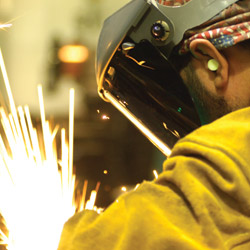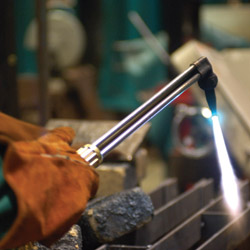
Ask someone about “skilled trades” and you may get a quizzical look. The meaning of the words depends on where you come from, according to Robert Branan, teaching chair and associate professor in Illinois Central College’s Agricultural and Industrial Technologies department. “I come from the blue-collar world, and there, a skilled trade involves getting on-the-job training, usually from apprentice to journeyman,” says Branan. “As an educator, I see skilled trades as the integration of on-the-job knowledge and skills with academics. The people who combine the best of both worlds are in the most demand today.”
A career in skilled trades means most likely working in the manufacturing arena, according to Branan. Skilled trades workers are the backbone of these enterprises, providing the companies with welders, mechanical drafters, industrial electrical technicians, machinists, mold makers, tool-and-die makers, maintenance mechanics and engineering technologists. ICC offers programs that train students for all of these careers.
Branan knows both sides of skilled trades from personal experience. He chose to leave high school, then earned his GED and came back to ICC to take some welding classes, “mostly because I had a family and needed to make money quickly.” Over roughly 15 years, he continued to take classes, eventually earning his associate degree and then a bachelor degree in engineering from Bradley. He also holds a master’s degree in education from the University of Illinois.
Well aware of both the training he received on the job and the coursework he took at ICC, Branan believes strongly in marrying academics and skills. “What we do here is take those on-the-job skills and integrate the academics. The non-technical courses add to those skills and accentuate those abilities,” he says. Branan noted that in today’s economic climate, ICC is attracting students right out of high school, as well as non-traditional students who may have lost their jobs or are trying to strengthen their marketability.
“We’re very positive about the students we’re getting. The diversity in our classes adds to the educational experience,” says Branan. “We know their side of it, and we care about what’s happening to them and what’s happening in their lives.” He adds that even though he wasn’t a fan of taking the “academic” coursework when he was in school, he’s found this coursework valuable. “The soft skills help you get somewhere. You learn how to network and negotiate, and how to collaborate and mentor others.”
 In addition to the “soft skills” acquired through academics, ICC’s technical training is comprehensive. “We have equipment here from the base to the best. It gives students a broad exposure to the equipment they’ll use in the work world. It’s good for students to see what they will encounter in the job market. Not every company is cutting-edge,” notes Branan. The math and science courses taken by students to earn their associate degree “takes the students into greater depth in their work” than what they can pick up on the job. “It broadens their horizons,” he explains.
In addition to the “soft skills” acquired through academics, ICC’s technical training is comprehensive. “We have equipment here from the base to the best. It gives students a broad exposure to the equipment they’ll use in the work world. It’s good for students to see what they will encounter in the job market. Not every company is cutting-edge,” notes Branan. The math and science courses taken by students to earn their associate degree “takes the students into greater depth in their work” than what they can pick up on the job. “It broadens their horizons,” he explains.
“I’m an ICC success story,” exclaims Branan. “It wasn’t too long ago that I was a student here, and some of my instructors are now my colleagues.” He notes that teaching—and teaching alone—is the focus of community college instructors. “Our classes are more hands-on, more interactive. All of our instructors have certifications in their fields and are master teachers. Our instructors are focused on teaching and provide high-quality instruction. Many also teach at the university level in engineering or manufacturing.”
Branan feels that the support of education in the skilled trades arena is vital to the health of the Peoria region. “We’re in the heart of a great manufacturing area,” he says. “We have to make learning these skills accessible. If we don’t train the workforce, the jobs will go overseas. We want to keep them here.” He notes that ICC is much less expensive than many technical schools, and that means greater value for students.
ICC has also been strengthening partnerships with those in central Illinois interested in manufacturing and the skilled trades. “We’re working with the Economic Development Council and the EDGE Manufacturing Strategic Planning Group to create interest in manufacturing skilled trades for the future,” says Associate Dean Michael Sloan. “We are also working on the makeitillinois.org website. This site gives parents, students and others an overview of manufacturing, a key user of those with skilled trades. It’s a great resource for those who want to learn more about these careers.” iBi

